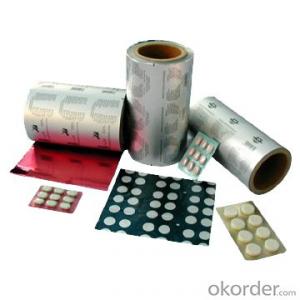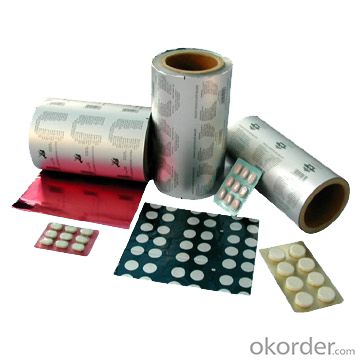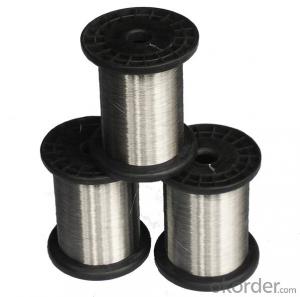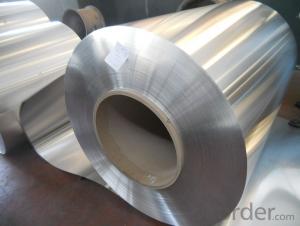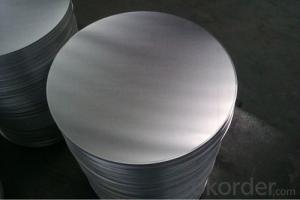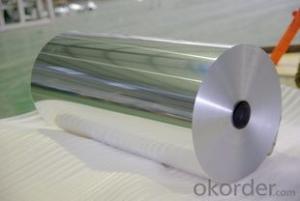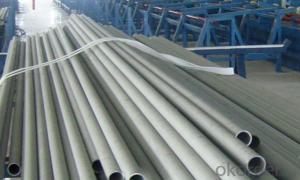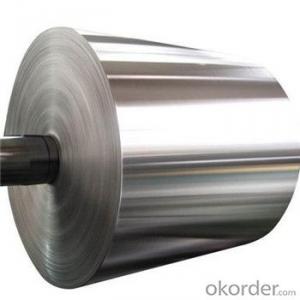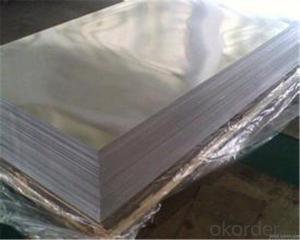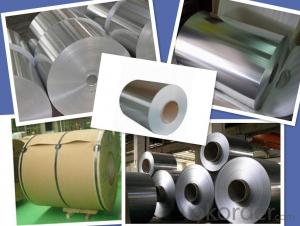Perforated Rolls Aluminum Sheets for Medical and Food Packaging
- Loading Port:
- Shanghai
- Payment Terms:
- TT OR LC
- Min Order Qty:
- 5 m.t
- Supply Capability:
- 5000 m.t/month
OKorder Service Pledge
OKorder Financial Service
You Might Also Like
Aluminium blister foil manufacture in China,Sichuan Hui Li Industry Co.,Ltd supply pharmaceutical packaging foil as bellow:
aluminium foil,20my/30my, hard tempered, dull/bright side, one side primered for printing, the other side thermo seal lacquered against PVC/PVDC, supplied in reels, unprinted or printed according to artwork provided, max 4 colour text,Max width:800mm,roll length is 1200m,or per client’s request.
Application:
Excellent properties such as of anti-oxygen, moisture-proof, leak-proof, antipollution, etc.
High stability and sanitation.
Heat-sealing with PVC or PVDC sheet.
Blister packages for pharmaceutical products such as capsules and tablets, pill, pastille, small-size food, candy, etc.
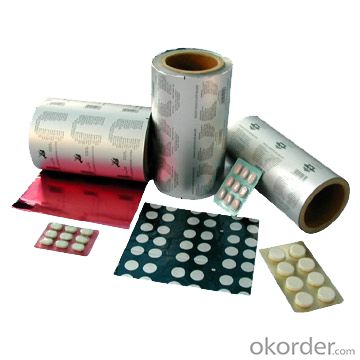
- Q: An aluminum engine block has a volume of 4.77 and a mass of 12.88 .
- Aluminum okorder /
- Q: how to process 0.3mm hole on aluminum material?
- punching wire-electrode cutting
- Q: Can aluminum sheet be used for automotive body panels?
- Automotive body panels can indeed utilize aluminum sheets. In fact, aluminum is gaining popularity in the automotive industry due to its numerous advantages. Firstly, aluminum surpasses steel in terms of weight, leading to improved fuel efficiency and overall vehicle performance. Furthermore, aluminum boasts high resistance to corrosion, providing durability for body panels exposed to the elements. Additionally, aluminum exhibits remarkable formability, enabling the creation of intricate designs and enhancing design flexibility during vehicle production. Moreover, aluminum excels in absorbing crash impact, thereby enhancing vehicle safety. Nevertheless, it is important to acknowledge that utilizing aluminum for automotive body panels may necessitate specialized equipment and techniques for welding and repair purposes.
- Q: How thick are aluminum sheets commonly available?
- Aluminum sheets commonly come in various thicknesses, depending on the intended use and application. The most commonly available aluminum sheet thicknesses range from 0.025 inches (0.63 mm) to 0.125 inches (3.18 mm). However, thinner and thicker aluminum sheets are also available, with some going as thin as 0.016 inches (0.4 mm) and others as thick as 0.25 inches (6.35 mm) or more. The specific thickness required will depend on the specific project or industry application.
- Q: When water continually sprays on the aluminum sheet, how to avoid corrosion of aluminum sheet and keep its water resistance?
- Don’t worry about it, after aluminum contacts water or air, a layer of oxide film will generate on its surface to separate aluminum from the water or air and protect it, so it won’t be erosive.
- Q: Calculate the mass in grams of Iodine (I2) that will react completely with 20.4 g of aluminum to form aluminum oxide (AlL3)
- Aluminium oxide? Shouldn't it be Aluminium iodide? 1. Form a balanced equation 3I2 + 4Al - 2Al2I3 2. Number of moles of Al 20.4/(Mr of Al) = 20.4/27 = 0.7555mol 3. Number of moles of I2 0.7555/4 x 3 = 0.5666mol 4. Mass of I2 required = 0.5666 x Mr of I2 = 0.5666 x (127x2) Ans: 143.9164g
- Q: does anyone know how aluminum recycling works in term of redox reaction ( oxidizing, reduced, oxidizing agent, reducing agent?). how is that relate to the process of electrochemistry?
- Aluminum recycling is done by just melting the cans back into molten metal. There are reactions, but those deal with the impurities, not the aluminum. See the reference.
- Q: Can aluminum sheets be used for heat exchangers?
- Yes, aluminum sheets can be used for heat exchangers. Aluminum is a highly efficient conductor of heat, making it an ideal material for heat exchangers. Its high thermal conductivity allows for excellent heat transfer between fluids, resulting in efficient heat exchange. Additionally, aluminum sheets are lightweight, corrosion-resistant, and have good mechanical properties, further contributing to their suitability for heat exchanger applications.
- Q: What are the benefits of using aluminum sheets?
- There are several benefits of using aluminum sheets in various applications. Firstly, aluminum sheets are lightweight, making them easy to handle and transport. This characteristic is particularly advantageous in industries such as aerospace, automotive, and construction, where weight reduction is crucial for fuel efficiency and overall performance. Secondly, aluminum sheets offer excellent corrosion resistance. Unlike other metals, aluminum naturally forms a protective oxide layer when exposed to air, preventing further corrosion and enhancing its durability. This makes aluminum sheets highly suitable for outdoor applications or in environments with high humidity or corrosive substances. Another benefit of using aluminum sheets is their high strength-to-weight ratio. Aluminum is known for its exceptional strength, allowing it to withstand heavy loads or extreme conditions without compromising its structural integrity. This makes it an ideal choice for constructing lightweight but sturdy structures, such as building facades, vehicles, or industrial equipment. Additionally, aluminum sheets are highly malleable and ductile, meaning they can be easily formed into various shapes and sizes. This flexibility allows for intricate designs and customization, making aluminum sheets highly versatile and adaptable to different manufacturing processes or project requirements. Furthermore, aluminum is a sustainable and environmentally friendly material. It is 100% recyclable, meaning it can be reused repeatedly without losing its properties or quality. Recycling aluminum requires significantly less energy compared to the production of primary aluminum, resulting in reduced carbon emissions and a reduced environmental impact. Lastly, aluminum sheets have excellent thermal and electrical conductivity properties. This makes them suitable for applications that require efficient heat transfer or electrical conductivity, such as heat exchangers, solar panels, or electrical wires. Overall, the benefits of using aluminum sheets include their lightweight nature, corrosion resistance, high strength-to-weight ratio, malleability, sustainability, and excellent thermal and electrical conductivity. These advantages make aluminum sheets a popular choice in various industries, contributing to improved performance, cost-effectiveness, and environmental sustainability.
- Q: How does aluminum sheet perform in outdoor applications?
- Aluminum sheet performs exceptionally well in outdoor applications due to its inherent corrosion resistance and durability. It is highly resistant to rust and can withstand exposure to harsh weather conditions, making it ideal for outdoor structures, signage, and cladding. Additionally, aluminum sheets can be coated or painted to enhance their weather resistance and aesthetic appeal. Overall, aluminum sheet is a reliable and long-lasting material for various outdoor applications.
Send your message to us
Perforated Rolls Aluminum Sheets for Medical and Food Packaging
- Loading Port:
- Shanghai
- Payment Terms:
- TT OR LC
- Min Order Qty:
- 5 m.t
- Supply Capability:
- 5000 m.t/month
OKorder Service Pledge
OKorder Financial Service
Similar products
Hot products
Hot Searches
Related keywords
